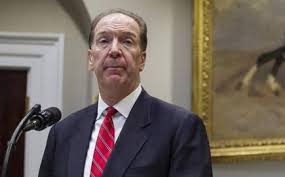By Aaron Ukodie, monitoring the World Bank annual meeting from Lagos

World Bank Group President David Malpass is worried that global economy is growing sluggishly, manufacturing activity is softening, while trade is weakening, with one out of 12 people on the planet living in extreme poverty.
Malpass made the comment this morning while briefing the press at the 2019 Annual Meetings Opening Press Conference Washington, DC, United States
He said the challenges of climate change and fragility are making poor countries more vulnerable which makes the global economic body’s goals of reducing extreme poverty and boosting shared prosperity even harder with 700 million people still living in extreme poverty. That’s about one in 12 people on the planet.
Inspite of the gloomy picture painted by Malpass, he said there was still good news, as he expresses hope that broad-based growth is still possible for countries.
“With the right mix of policies and structural reforms, countries can unleash growth that’s broadly shared across all segments of society. This is especially true in emerging markets and developing countries, where well-designed reforms can deliver meaningful gains. In short, we seek material impact in terms of broad-based growth, transparency, the rule of law, and private-sector expansion.
He said the world need to be careful how it calibrates responses to the global slowdown, saying that many countries have already used up their fiscal and monetary-policy space, so structural reforms are essential.
Over $15 trillion in bonds have zero or negative yields, which amounts to frozen capital as debt has climbed to troubling levels. We need fresh thinking to reignite growth, he said.
“At the World Bank Group, we’re staying focused on our mission. We’re helping countries build strong programs tailored to the unique circumstances of their economies.
“We’re encouraging innovations that attract private-sector investment, such as digital money. We’re promoting the rule of law and transparency in debt management and public finances.
“ We’re investing to help countries gain access to electricity and clean water, ensure the full inclusion of girls and women, address climate change and protect the environment, improve health and nutrition, and bolster infrastructure”, Malpass added.
The WB would later today highlight the importance of education and launching a new approach to measure learning which looks at the proportion of children aged 10 who can read and understand a basic story. “We want to reduce learning poverty as much as possible”, he said.
The WB is also discussing with its member countries how to replenish the financial resources of IDA, and its fund for the poorest countries. The proposed replenishment directs more funding toward people in fragile and conflict-affected situations, and reaffirms our commitment to projects that benefit the climate and promote gender inclusion.
Malpass said well-designed structural reforms are needed to unlock growth and build the foundations for future prosperity as current global economic problems include oligopolies, excessive public-sector employment and pension promises, and subsidies for goods, services and financing.










